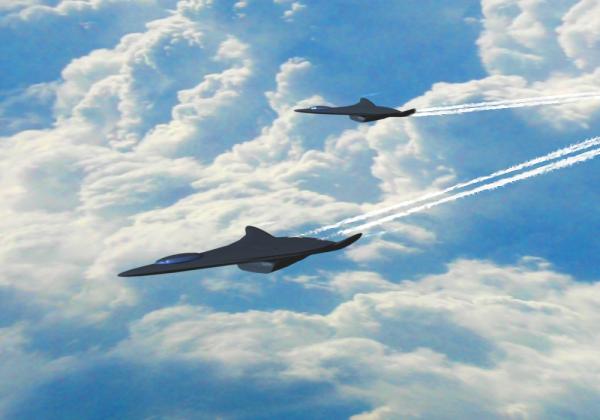BY LETTER
Atmospheric Weapons
 Image from Steve Bowers |
Atmospheric weapons are weapons systems designed to operate while flying in a planetary atmosphere or habitat's air. Atmospheric weapons include remotely piloted vehicles (RPVs), atmospheric fighters (both crewed and automated), and flying weapons platforms of various types including militarized synsect swarms and other classes of aerial robotic combat drones.
Articles
- Aron Tech VX12 Trans-atmospheric Fighter - Text by Thorbørn Steen
Popular nanotech fighter first created by Aron Tech. - Boombooster - Text by Todd Drashner
Modified application of ACER technology used to rapidly launch or redirect automated weapons or other devices. - Boostbomb - Text by Todd Drashner and Adam Getchell
Total conversion bomb. - Ceres Astrospace Delta - Text by Grant Thomas
Long-range exoatmospheric fighter used for planetary and orbital defense. Designed and built by Ceres Astrospace and later manufactured under license. - Disassembler - Text by M. Alan Kazlev, updated by Steve Bowers 2024
A system of very-small-scale devices, able to take an object apart a few atoms at a time, while recording its structure at the molecular level. Often employed as a swarm or part of a swarm. This could be used for uploading, copying objects (when used with an assembler system), a dissolving agent or a weapon. - Exoatmospheric Fighter - Text by M. Alan Kazlev
A small planet- ship- or orbital- based hybrid air- and space-craft, usually short- to very short range and armed with lasers and automatic cannon. Crew may include one or two bionts and several dedicated ai, or the whole vessel may be ai controlled. Propulsion is via jet or nanobank turbine for dense or slow atmospheric flight, ramjet or scramjet for hypersonic flight, and chemical, fusion or amat rocket for vacuum propulsion. - Goo - Text by M. Alan Kazlev
A general term for replicators, especially but not exclusively small replicators, often with the implication of hazard from possible uncontrolled replication. A nanoswarm capable of spreading and growing, particularly if it has escaped its original parameters, is commonly referred to as goo. - Gunboat/Gunship - Text by M. Alan Kazlev
Generally, a heavily armed and armoured, short-range military vessel, capable of operating in a hydrospheric, atmospheric, and exoatmospheric (vacuum-capable) environment for prolonged periods of time. - Limitations of Nanoweapons - Text by Michael Walton
Nanoweapons have a number of inherent limitations which mean that, in practice, countermeasures can be devised to slow down or stop many or most forms of nanoattack. - Military Spore Technology - Text by Todd Drashner
Spore technology is a common defence and self-preservation strategy employed by many devices operating in hostile environments. A spore device, typically a bot or vec, periodically releases numerous small "spores" that quickly conceal themselves and then go dormant for some period of time or until they receive an activation signal or, conversely, cease to receive a signal. At this point, the spores begin to rapidly and often stealthily replicate and then construct a duplicate of the original combat unit. - Optical Phased Arrays - Text by Luke Campbell and Steve Bowers
An optical phased array (OPA) uses phase technology to produce a wide range of optical images and emissions. - Railgun - Text by M. Alan Kazlev
A ship or vehicular mounted kinetic weapon that uses magnetic fields to accelerate a shell at very high velocity - Weather Machines - Text by Steve Bowers and Todd Drashner, with additional material by J. Storrs Hall
Atmospheric devices designed to affect the energy flow of the atmosphere
Related Topics
Development Notes
Text by Todd Drashner
Initially published on 31 December 2007.
Initially published on 31 December 2007.
Additional Information






